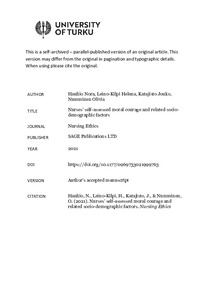Nurses' self-assessed moral courage and related socio-demographic factors
Hauhio Nora; Leino-Kilpi Helena; Katajisto Jouko; Numminen Olivia
https://urn.fi/URN:NBN:fi-fe2021093049057
Tiivistelmä
Background: Nurses need moral courage to ensure ethically good care. Moral courage is an individual characteristic and therefore it is relevant to examine its association with nurses' socio-demographic factors.
Objective: To describe nurses' self-assessed level of moral courage and its association with their socio-demographic factors.
Research design: Quantitative descriptive cross-sectional study. The data were collected with Nurses' Moral Courage Scale and analyzed statistically.
Participants and research context: A total of 482 registered nurses from a major university hospital in Southern Finland completed the Finnish language version of Nurses' Moral Courage Scale in autumn 2017.
Ethical considerations: Ethical approval was obtained from the university ethics committee and permission for the data collection from the participating hospital. Ethical principles and scientific guidelines were followed throughout the research process.
Findings: Nurses' self-assessed level of moral courage was rather high. On Visual Analogy Scale (0-10), the mean value was 8.20 and the mean score of the four dimensional, 21-item Nurses' Moral Courage Scale was 4.09 on a 5-point Likert-type scale. Respondents' gender, present work role, ethical knowledge base, additional ethics education, self-study as a means to acquire ethical knowledge, and frequency of work situations needing moral courage were statistically significantly associated with nurses' moral courage.
Discussion: Strongest association was found between nurses' higher moral courage level and formal and informal ethics education. Honesty and patient's humane and dignified encounter received the highest scores indicating respondents' internalization of the core values of nursing.
Conclusion: Although nurses were fairly morally courageous, moral courage should be a part of nurses' basic and continuing education thus covering its theoretical and practical learning. Since moral courage is a virtue that can be taught, learnt, and practiced, education is a relevant way to maintain and further strengthen nurses' moral courage.
Kokoelmat
- Rinnakkaistallenteet [29337]
